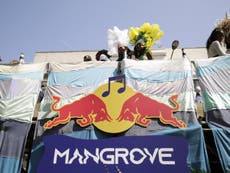Notting Hill Carnival may be cancelled this year, but the Million People March has re-focused its anti-racist roots
These are the bare bones of the historic event. We should remember that

Coronavirus has taken many things from us. Loved ones, job opportunities, the comfort of regular human contact. Cumulatively, it has been devastating. And this weekend, for those of us who grew up with the revelry, sense of community (and, for many, revenue) that comes with Notting Hill Carnival, the loss of the event is a similarly bitter pill to swallow.
According to Ishmahil Blagrove, writer, filmmaker and author of Carnival: A Photographic and Testimonial History of the Notting Hill Carnival, the only other time Notting Hill Carnival has been cancelled was in 1970, after Rhaune Laslett, one of the founders of the annual celebration, “stepped away from managing the event as a result of the tensions that were brewing in the area” because of “continual raids on the Mangrove Restaurant that led to the Mangrove Nine trials.”
Clearly, from its creation through the efforts of Laslett and separately, Claudia Jones, to its initial cancellation, carnival has always been steeped in political and social resistance. Even if it’s not taking place this year in the way that we’re used to – ever-flowing rum, pounding music, streets sticky with urine in that way you only appreciate if Notting Hill Carnival feels, to you, like home – that spirit is still very much alive, not just in the neighbourhoods surrounding the parade route, undoubtedly planning on holding their own contained celebrations, but nation, and hopefully worldwide too. Because this Sunday, hours after the March on Washington in the US, there’s a similar push against the tyranny of unchecked racism and prejudice in the UK: the Million People March.
Founded as a way of putting “further pressure on the UK government” over its seeming indifference towards racism, and in particular, anti-black racism, the demonstration (taking place from 1pm, from the very heart of carnival to Hyde Park) is a poetic echo of the circumstances that led to carnival in the first place.
In the aftermath of the 1958 Notting Hill race riots and the racist murder of Kelso Cochrane in 1959, there were similar anti-racism efforts. Cochrane, an Antiguan carpenter, was killed at the hands of a group of white men at the climax of rising anxieties over violence and intimidation from fascist groups including Oswald Mosley’s British Union of Fascists and offshoots such as the White Defence League. People were angry. And not solely because of the tragedy that had just unfolded, but also because of the coverage it received in the press, and crucially, the treatment of the case by the police, who initially dismissed it as a simple robbery.
Like Stephen Lawrence’s case some 34 years later, there would be no conclusion to the investigation. And there would be few answers provided for his family either. It was only in 2007 that Cochrane’s daughter knew who he was and how he’d died, travelling to London for the first time last year to learn more about his story.
In the face of that systemic racism, however, local activists resisted, organising through groups such as the Coloured People’s Progressive Association and figures like Claudia Jones, the Trinidadian activist, newspaper editor and organiser of the first Caribbean carnival at St Pancras Town Hall (now Camden Town Hall). There were protests in Whitehall. Cochrane’s funeral – the funds raised by the Interracial Friendship Coordinating Council founded by Jones and Amy Ashwood Garvey – was said to have been attended by hundreds in a very public message against the violence and intimidation tactics of local racist groups. If you take a walk to Kensal Green cemetery, as I did a couple of days ago, you can still see Cochrane’s grave and a fading mosaic of his spectacled face staring up at you.
Everything we’re doing today because of similar gaslighting, violence, police brutality, negligence and the refusal from the government to sincerely engage with ousting anti-black racism, has been done before. I say that not out of hopelessness, but out of a sense of duty to keep this often ignored history alive, and crucially, to show that everything we’re seeing today has an acute connection to so many things we’ve been taught to think of as “before our time”.
Though things have changed, we are battling the same beast these activists were blasting around 60 years ago. The eagerness in some sections of the press to excuse the heartless acts of white racist murders, terrorists – you name it – is still very much present. Similar anti-immigration laws and tactics that figures such as Jones challenged in the early 1960s are being intensified to inhumane degrees today. And through it all, black people and people of colour are still screaming out for support – not only from individuals who’ve shied away from anti-racist action but from the state and other powerful British institutions.
These are the bare bones of Notting Hill Carnival. It’s a brilliant thing that, even in a pandemic, the appetite for protest in the face of injustice has not faltered. After the Million People March, if ever we see a return to carnival as so many of us know it, I hope that’s not forgotten.






Join our commenting forum
Join thought-provoking conversations, follow other Independent readers and see their replies